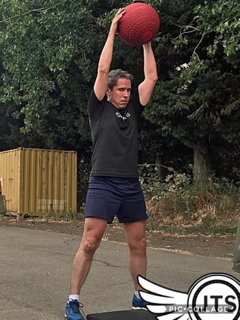Required
Anxiety Disorders – Why you should get moving to treat anxiety
Anxiety Disorders – Why you should get moving to treat anxiety
As I write this I’m feeling a bit sorry for myself because it’s a Saturday and not just any old Saturday, but a very rare one where I’ve had to miss bootcamp. I’ve tweaked something in my back and it’s letting me know about (loud and clear!) any time I try and exert myself so it’s an enforced exercise abstinence for me for a few days.
I’m already getting twitchy and eager to get back to it because I know how valuable and beneficial exercise is to my happiness and mental and physical well-being. It was true when I had anxiety and it’s just as true now.
A lot gets written about how exercise is good for your mental health and how if you are battling anxiety it can help you feel better. And now there is solid evidence, in the form of a recently published systematic review of meta-analysis, for the effectiveness of exercise in the treatment of anxiety disorders and about the level of intensity of exercise required to lead to improvement. As an exercise lover this is music to my ears and is certainly good news for anyone seeking to implement a treatment plan to overcome anxiety.
Because like I said, exercise is a very useful mental health boosting activity (and at JTS Fitness you get to do some pretty high intensity stuff like lifting a heavy red ball and slamming it down….and then lifting and slamming…and more lifting and slamming…)

Exercise Anxiety Treatment
The aim of the systematic review was to assess the use of exercise in the treatment of anxiety and to assess the benefit of high intensity exercise versus low intensity exercise. The researchers looked at the results of fifteen studies comprising of 675 people with raised anxiety or a diagnosed anxiety disorder.
Having reviewed the evidence, they concluded that, ‘Exercise programmes are a viable treatment option for the treatment of anxiety. High intensity exercise regimens were found to be more effective than low intensity regimens’.
And of course exercise has relatively few potential side effects and can also promote other health and well-being outcomes such as weight loss. As well as physiological changes, engaging in exercise can lead to an increased confidence in your ability to cope with anxiety, it can involve getting out and being more social and it certainly can provide a distraction from anxious thoughts and feelings.
Interestingly, the findings also suggest that higher intensity exercise may be more beneficial than lower intensity exercise in reducing anxiety, although more research would be needed to confirm this.
So as well as psychological support, such as hypnotherapy, if you have anxiety issues, it makes sense to start moving more and to benefit from the mental health and physical benefits of this. Often I will set it as a task for my clients to get out for a walk each day because getting out and moving more tend to make us feel better. We can become more focused on the present and what we can see and hear around us, rather than spending time in anxious rumination. It also eases all of those unwelcome physical sensations that seem to magnify if we don’t do something about them and exercise.
Now I definitely can’t wait for my muscles to recover so I can get back to my high intensity bootcamp. As the evidence shows and I know from experience, there’s nothing quite like it for letting go of stresses, strains and tension. So what are you waiting for: go get moving!
To your success,
Dan Regan
Anxiety Disorders Hypnotherapy in Ely and Newmarket
Struggling with anxiety, stress, worry and fear and need some help? Find out how I can help with a Complimentary Hypnotherapy Strategy Session. Learn more here: Appointments
Find out what dozens of other people have said after their hypnotherapy sessions with Dan: Hypnotherapy Testimonials
And check out these powerful hypnosis downloads that can start helping you right away with anxiety, confidence and more: Hypnosis Downloads
Reference: Exercise in the treatment of clinical anxiety in general practice – a systematic review and meta-analysis. Elizabeth Aylett, Nicola Small and Peter Bower. BMC Health Services Research201818:559 https://doi.org/10.1186/s12913-018-3313-5
Get Your Copy Right Now…
Subscribe to Dan’s Digest filled with tips, strategies and techniques and get instant access to your free rapid relaxation hypnosis audio track.
Enjoy feeling and being more mentally calm and physically relaxed right now:




0 Comments